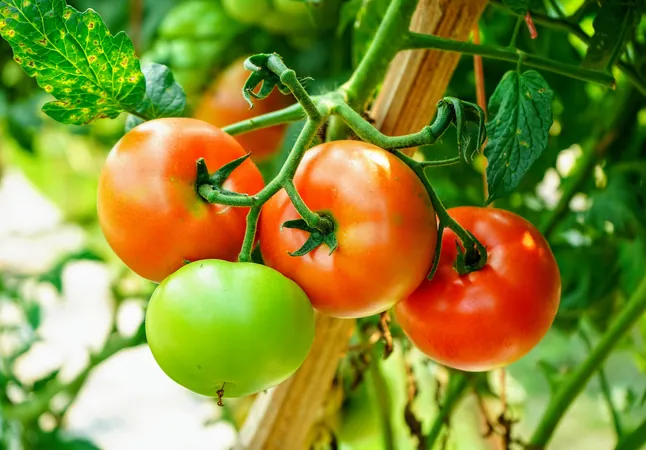
Unlocking the Secrets of Aging: What Ripening Tomatoes Could Teach Us About Longevity
2025-05-13
Author: Li
Discovering the Connection Between Tomatoes and Human Aging
A groundbreaking study suggests that the ripening process of tomatoes could unveil critical insights into the cellular mechanisms that govern aging in humans. Conducted by Dr. Simon Michaeli and his team from the Volcani Institute, in collaboration with researchers from Israel and Germany, this research highlights the role of autophagy—a natural recycling process in cells—in both tomato ripening and potential human aging.
The Role of Autophagy in Aging
Autophagy is like a cellular spring cleaning, vital for most organisms, with the exception of bacteria. It helps break down and recycle damaged cellular components, promoting longevity and healthier lifespans. In animals, this cleanup process clears out unwanted materials, preventing cellular accumulation that can lead to aging. While previous research hinted at its importance in plants, its specific influence on fruit ripening remained a mystery—until now.
How Ethylene Triggers Ripening
At the center of this study is ethylene, the hormone responsible for transforming green tomatoes into ripe, juicy ones. This hormone also plays a crucial role in other fruits like apples and bananas. By regulating ethylene production, scientists can predict and manage the ripening timeline—too much ethylene leads to premature spoilage, while too little might leave fruits unripe and flavorless.
Key Findings from Tomato Experiments
To uncover the relationship between autophagy and ripening, researchers inhibited autophagy genes in mature tomatoes. The results were startling: these tomatoes began to ripen far too soon, indicating that autophagy is essential for maintaining balanced ethylene levels. When the recycling process was disrupted, ethylene production surged, accelerating ripening and leading to quicker aging.
Tackling Food Waste with Science
The implications of this research are significant for agricultural producers. With around 40% of global agricultural produce wasted, managing the ripening process efficiently could reduce spoilage and enhance profit margins. Dr. Michaeli emphasized that by understanding cellular mechanisms, the team aims to ensure fresher fruits while also minimizing environmental impact.
Future Prospects in Agricultural Science
This tomato study is just the beginning. The concept of autophagy could have far-reaching applications across various crops, despite differing responses to ethylene among fruit types. Future research might focus on selectively manipulating autophagy pathways to delay ripening without compromising other vital growth functions.
Unpacking Aging Lessons from Fruit
While tomato biology is fascinating on its own, it also beckons deeper inquiries into human aging. Just as ripening tomatoes need a balanced system for peak quality, our bodies rely on autophagy for maintenance and longevity. This research could potentially illuminate shared aging processes across species, enhancing our understanding of how to promote healthier lives.
Conclusion: A Fruitful Path to Understanding Longevity
With promising findings published in 'New Phytologist,' this study opens avenues for reducing food waste, improving crop quality, and unraveling the biological intricacies of aging. As scientists continue to decode the mysteries of autophagy, we may not only reap the benefits of fresher produce but also gain crucial insights into extending our own lifespans.

 Brasil (PT)
Brasil (PT)
 Canada (EN)
Canada (EN)
 Chile (ES)
Chile (ES)
 Česko (CS)
Česko (CS)
 대한민국 (KO)
대한민국 (KO)
 España (ES)
España (ES)
 France (FR)
France (FR)
 Hong Kong (EN)
Hong Kong (EN)
 Italia (IT)
Italia (IT)
 日本 (JA)
日本 (JA)
 Magyarország (HU)
Magyarország (HU)
 Norge (NO)
Norge (NO)
 Polska (PL)
Polska (PL)
 Schweiz (DE)
Schweiz (DE)
 Singapore (EN)
Singapore (EN)
 Sverige (SV)
Sverige (SV)
 Suomi (FI)
Suomi (FI)
 Türkiye (TR)
Türkiye (TR)
 الإمارات العربية المتحدة (AR)
الإمارات العربية المتحدة (AR)